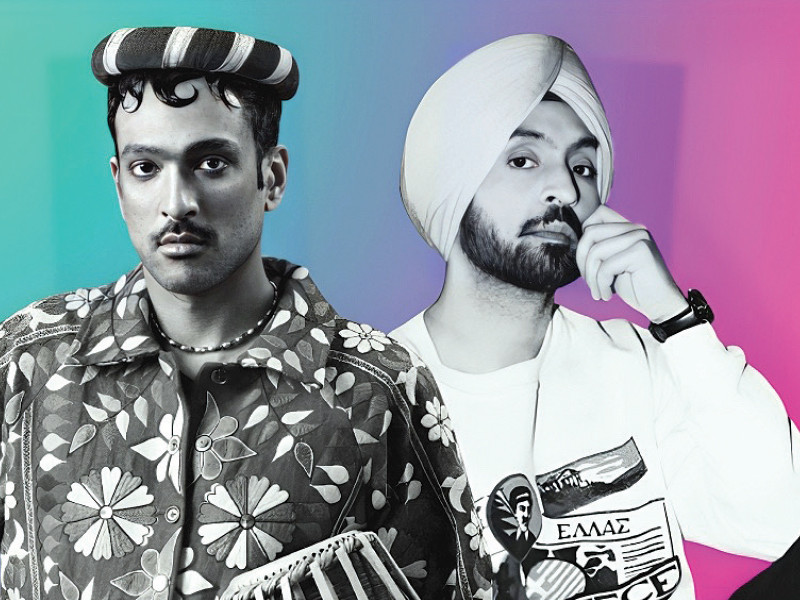
For all the bad rep the internet gets for hosting culture wars, they are by no chance new. Who gets to be what has been the basis of most communal solidarities and social upheaval. So it inspires no surprise when director Abu Aleeha announces a new contest of authenticity.
Diljit Dosanjh and Ali Sethi star as the unassuming rivals of this latest identity saga. The winner is the artist who can showcase Punjabi pride with the rightful protocol. Of course, for Abu Aleeha and many others, the contest was won long before it became one.
“Diljit Dosanjh’s global successes showcase the power of cultural pride,” proclaims the man who hit the big screen recently with his glaringly flawed but well-meaning Taxali Gate. “He rose to international fame by proudly promoting Punjabi language and traditional attire. In contrast, Ali Sethi’s performance at Coachella, where he sang a Punjabi song but adopted a Barbie doll-like appearance, highlights the importance of authentic cultural representation.”
“This example refutes the notion that Pakistanis don’t support their artists, instead emphasising the need for artists to honour their cultural heritage genuinely,” the Instagram comment concludes on a self-defeating note. After all, whether or not Sethi is a loyal projection of said “cultural pride,” he has amassed a generous fandom.
The golden days
There’s a lot to unpack in the filmmaker’s statement, which in his defence, is at best a perfunctory nod at a rapidly changing political climate. Back when culture wars served as a prelude to reform or an actual war, they carried a certain sobriety that most baby boomers and Gen X-ers can fondly look back to. Think: farmer and student protests in the supposed golden era of Ayub Khan, dupatta-burning feminists versus Ziaul Haq, coincidentally also the time when Nazia and Zoheb exploded in the global pop scene.
These cultural tensions have had the benefit of time, a stark opposite of the mercurial passage of social media. Another generation exists, younger and more attuned to outrage and solidarities based around fickle algorithms. One that has grown up in an idpol-infused digital age of unprecedented reach. Be it the proliferation of xenogenders on Reddit or debating who mainstreamed gender neutral fashion (Jaden Smith or Harry Styles). The real ones were there to witness Conan Gray get cancelled for using the wrong skin tone for his clapping emoji.
Dominant as they may appear, these digital cultures do not neatly map onto Pakistan and India’s side of the internet. Separately, Abida Parveen and Falguni Pathak can become queer icons in online subcultures while others will still preach their own gospel in the comment section of Mahira Khan and Esra Bilgic. And yet, even as Pakistani internet cooks up its own highs and dogmas, it somehow taps into a global reservoir of anxieties. Case in point: a perceived threat to tradition equals a threat to masculinity.
What an artist owes
Abu Aleeha pits together two Punjabi artists in a debate on authenticity, origins and loyalty — a dispute almost as old as time. Given how the three belong to the same generation of artists (and men), the director’s remarks cannot be brushed side as a generational fallacy. In Sethi vs Dosanjh, he takes for granted both class and tradition.
Sethi’s critics have long bemoaned his coming from a known, affluent family. Conversely, Dosanjh is better suited to a rags to riches narrativisation. Such romantic pinings are commonplace for fandoms in hopes of subscribing to a more relatable artist. On the other hand, the charge of cultural inauthenticity cannot be handed out innocently. Especially after one concurs that no artist is not beholden to fans and markets in how they fashion themselves.
That Dosanjh began making music in a country with a thriving Punjabi industry of arts counts for something. As does the fact that Pakistan’s urban imaginary can only stomach carefully curated doses of ‘cultural expression’. That every Coke Studio Pakistan song rendered in Balochi or Pashto needs Urdu or English to make it palatable. At the end of the day, there is no authenticity to culture aside from what its subscribers choose to make of it.

1672385156-0/Andrew-Tate-(1)1672385156-0-405x300.webp)





1732012836-0/Express-Tribune-(9)1732012836-0-270x192.webp)
1732005713-0/Express-Tribune-(6)1732005713-0-270x192.webp)


1732004244-0/Untitled-design-(13)1732004244-0-270x192.webp)






COMMENTS
Comments are moderated and generally will be posted if they are on-topic and not abusive.
For more information, please see our Comments FAQ